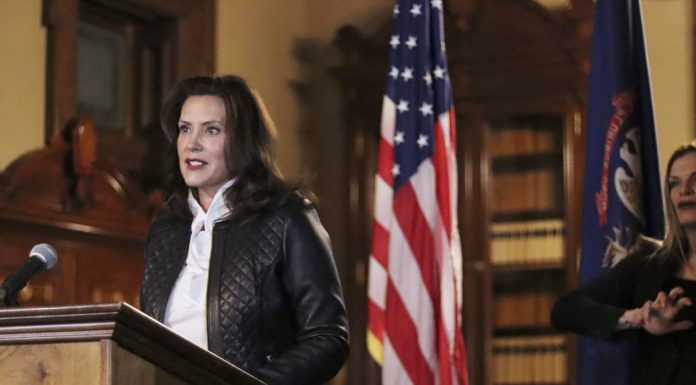(Headline USA) With secret recordings and other evidence, prosecutors hoped to show how four men were united behind a wild plot to kidnap Michigan’s governor in response to her aggressive steps to slow down COVID-19 during the early months of the pandemic.
But the trial also was likely to shed new light on the role that undercover FBI operatives played in engineering the plot at every level—a false-flag operation to undermine what they saw as an alarming rise in anti-government resistance that some have argued was a prototype for federal agents’ Jan. 6 psy-ops at the US Capitol.
“[T]he Whitmer trial will expose just what the FBI is capable of and willing to do to help Democrats score political points at the most opportune moments,” wrote Julie Kelly for American Greatness.
“At least 12 FBI informants and undercover agents participated in the ‘kidnapping’ scheme, which created damaging national headlines for Trump as early voting was underway in swing states including Michigan,” she added.
Jury selection begins Tuesday in the trial, which could last more than a month in federal court in western Michigan.
In 2020, Gov. Gretchen Whitmer—a radical, George Soros-backed Democrat who had made a name for herself as one of the most authoritarian leaders during pandemic lockdowns—was trading taunts with then-President Donald Trump over his administration’s response to COVID-19.
Her critics, meanwhile, were regularly protesting at the Michigan Capitol, clogging streets around the statehouse and legally carrying semi-automatic rifles into the building.
During that turbulent time, when stay-home orders were in place and the economy was restricted, Adam Fox, Brandon Caserta, Barry Croft Jr. and Daniel Harris were lured by federal agents into hatching a plot to kidnap Whitmer from her vacation home.
They’re accused of taking critical steps over several months, including secret messaging, gun drills in the woods and a night drive to northern Michigan to scout her second home and figure out how to blow up a bridge.
The FBI agents who infiltrated the group claim to have thwarted the plan with the arrests of six men in October 2020.
However, skeptics argue that the motley ‘militia’ lacked the motivation and vision to accomplish such a feat on their own.
Two of them, Ty Garbin and Kaleb Franks, have pleaded guilty and will appear as crucial witnesses for the government, giving jurors an inside view of what was planned.
Garbin, for example, said Fox, the alleged ringleader, wanted the men to chip in for a $4,000 explosive large enough to destroy a bridge near Whitmer’s home and distract police during a kidnapping.
“The blood of tyrants needs to be shed,” Garbin quoted Caserta as saying during a meeting, paraphrasing a famous quotation from Thomas Jefferson.
Garbin and Franks insist no one in the group acted because of excessive influence by agents or undercover informants.
“It is not the end of the case for the defense, but it’s a big obstacle to overcome,” John Smietanka, a former federal prosecutor, said of the pair’s cooperation. “It’s going to come down to the credibility of witnesses plus the effect of any extrinsic evidence, like tapes.”
Indeed, prosecutors said much of the evidence will be the defendants’ own words gathered during secret recordings. The government will also offer screenshots of text messages as well as photos and videos posted on social media.
Ahead of the trial, defense lawyers panned the case, especially the “staggering use” of informants. They deny any conspiracy to kidnap Whitmer and have signaled an entrapment defense.
“The agents and snitches recruited the defendants, arranged meetings, paid for travel, paid for hotels, rented cars, produced promotional videos demonstrating explosives, purchased equipment, vetted new members, hatched the ideas and directed the operations,” said Joshua Blanchard, who is Croft’s attorney.
Defense lawyer Christopher Gibbons said Fox did not want to kidnap Whitmer, though he made “many inflammatory remarks” about the governor and what he considered to be unconstitutional acts.
Agents and informants were the “binding force and catalyst for every event, impassioned speech and nearly every suggestion of criminality,” Gibbons said in a court filing.
Assistant U.S. Attorney Nils Kessler said informants were paid to collect information, not to induce crimes.
“The things they recorded were the defendants’ own words. That’s what makes the defendants look guilty,” Kessler told a judge Friday.
A successful entrapment defense requires evidence that the government induced someone to commit a crime that they otherwise wouldn’t be inclined to carry out, Smietanka said.
Whitmer, who is seeking reelection this year, rarely talks publicly about the case and isn’t expected to attend the trial.
After charges were filed in 2020, just weeks before the fall election, she accused Trump of “giving comfort” to antigovernment extremists with his rhetoric.
“The plots and threats against me, no matter how disturbing, could not deter me from doing everything I could to save as many lives as possible by listening to medical and health experts,” Whitmer said last summer, referring to COVID-19.
Separately, authorities in state court are prosecuting eight men who are accused of aiding the group.
Adapted from reporting by the Associated Press

